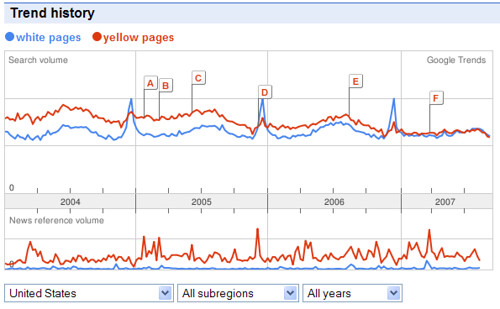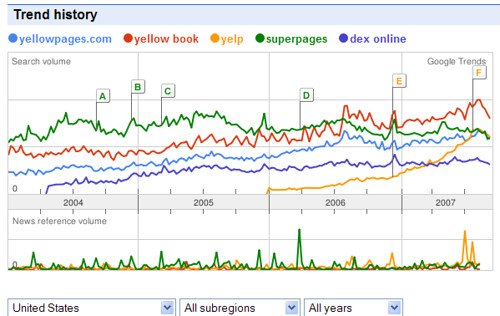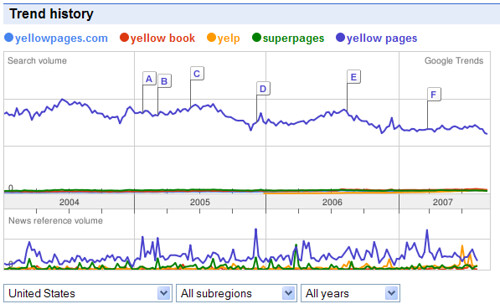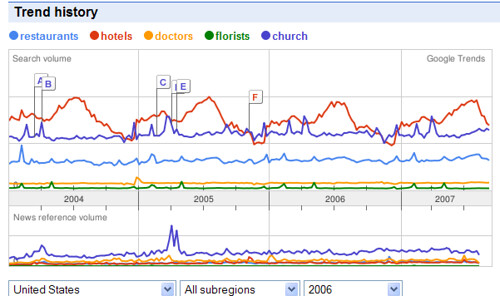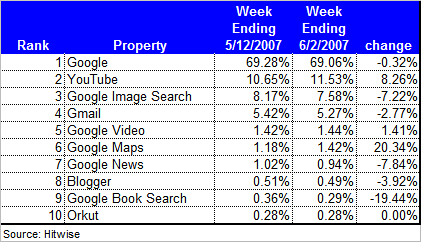Google Trends: Yellow Pages Will Be Toast In Four Years
Local marketing industry savants have long been predicting the demise of print Yellow Pages books, going the way of the buggy whip due to overwhelming competition from Internet alternatives. Further, the aggressive invasion of search engines into the local space during the past few years has inspired some analysts to wonder if Internet Yellow Pages […]
Local marketing industry savants have long been predicting the demise of print Yellow Pages books, going the way of the buggy whip due to overwhelming competition from Internet alternatives. Further, the aggressive invasion of search engines into the local space during the past few years has inspired some analysts to wonder if Internet Yellow Pages directories might also be headed for extinction along with the printed books. Readily available stats from Google show trends and provide a good sense of what’s actually going on across the local space on the Internet. Ironically, we can also use these stats to predict the demise of traditional Yellow Pages sites.
I did a search via Google Trends to compare the magnitude of searches for “yellow pages” and “white pages,” and here’s the chart of these searches from 2004 to present:
(Trends in searches for “White Pages” & “Yellow pages“)
Notice that keyword searches for “white pages” seems notably consistent year over year, while searches for “yellow pages” seem to be declining. There are a couple of ways we could interpret the dropping trend for YP searches. On one hand, we could assume that people aren’t looking for Yellow Pages sites as much because they’re able to find businesses through other types of sites and directly through the search engines themselves. An alternate interpretation could be that users might be going to the Yellow Pages sites directly, through typing in the URLs or bookmarking them. Are people searching in Google for “yellow pages” less because the IYP (Internet Yellow Pages) companies are making progress in improving their brand recognition?
Let’s compare to see whether users are searching more/less for specific IYP brand names:
(Comparing searches for Yellowpages.com, Yellow Book, Yelp, Superpages, and Dex Online.)
Quite a few of those online Yellow Pages sites are showing gains over the same period. “Superpages” searches are relatively flat, while searches for “YellowPages.com,” “Yellow Book,” “Yelp,” and “Dex Online” all show increasing trends. So, could we deduce that this rising brand-name recognition among most of the IYPs has caused fewer people to need to research “yellow pages” sites? I don’t believe so, at least based on keyword searches in Google. Far more users appear to be seeking “yellow pages” than are searching for particular IYP brand sites:
(Comparing searches for “Yellow Pages” vs. IYP brands)
At the very least it would appear that the increases in IYP brand-specific searches do not balance out the dropping trend in searches for “yellow pages”—the magnitude in searches for “yellow pages” far outpaces combined brand searches for IYPs.
Searches by types of local businesses or organizations seem highly consistent and stable in Google, year over year:
(Google searches for popular types of local business/organization listings)
Now, I realize it’s dangerous to base assumptions off such a limited fraction of total Internet statistics, and I’m making multiple suppositions here. Google Trends only shows relative amounts of total numbers of searches by keyword sequences, so the stats don’t necessarily have a direct correlation to total traffic. There are so many variables involved that there could be multiple, combined causes for what we’re seeing here. These trends could be specific to only Google users and not to everyone. And, actual usage of IYP sites may not be reflected by keyword searches for “yellow pages.” Yet, Google usage comprises such a large percentage of total online searches, and user search behavior there does often seem to reflect the contemporary zeitgeist. So, I think we could make some valid and intelligent assumptions based on these graphs.
It’s my opinion that Google’s (and the other top search engines) innovations in local search combined with increasing inclusion of business listing data in the search engine results pages (“SERPs”) is causing users’ behavior to change. Users are finding more and more of the information they’re seeking directly in SERPs, negating the need to find Internet Yellow Pages. Google Trends shows that users are increasingly seeking “Google Maps” just as they’re searching for “yellow pages” less:
(Comparing searches for “Google Maps” vs. “yellow pages”)
Is this an actual indicator for increasing usage of Google Maps, while YP usage could be decreasing? At least from some independent reporting, user visits to Google Maps do indeed appear to be fairly healthy and increasing over time. Consider this June report comparing one month’s usage of Google properties, provided by Hitwise (“Percentage U.S. Visits to Custom Category of Top Google Properties“:
Use of Google Maps appears to be increasing. Why would users perform searches for “Google Maps” when they could just click on the “Maps” tab/link? Well, most large sites share the experience of having their own domain names and features searched for in the search engines, and Google itself is apparently no exception.
Now, it would be better to be able to compare actual traffic figures from the top search engines and Internet Yellow Pages, but all of them keep pretty mum for strategic reasons. The best we can do is to project estimates and look to companies who report relative audience share and traffic based off of sample sets of the total population of Internet users. ComScore has also reported on relative IYP vs. Local Search vs. Search Engine usage over time, but as Greg Sterling observes, it’s been a bit hard of late to interpret their relative figures compared with past stats.
My gut feeling is that the Google Trends graph for searches for “yellow pages” is likely representative of a broad behavioral pattern of Internet users who are going to traditional Yellow Pages sites less and less. If we project the pattern out in time, we can see that searches for “yellow pages” might reduce down to nil by as soon as 2011:
Am I predicting the demise of the Yellow Pages and other local directories based off these projections? Not really! There’s too much investment in these companies for them to sit idly by as their market share and business foundations erode to search engine competition. The savvy companies are evolving themselves to stay relevant in the new paradigms. Sites like Idearc’s Superpages.com have been moving away from the “yellow pages” moniker by incorporating local search style components, social media characteristics, personalization, and partnering to develop major distribution networks. Local info publisher Marchex has developed a plan of bypassing search engines to large degree through local domaining, and sites like Yelp, Citysearch, Judy’s Book, and Local Guides have developed loyal followings through social media and user-generated content like reviews and sharing utilities.
Sure, all these types of sites are dependent upon referral traffic from the major search engines, as a Hitwise report on local search indicates. But, the major search engines like Google are unlikely to de-index all the business directory sites anytime soon, particularly since Google Maps has steadily enhanced its data with content supplied by many of these same local information companies. (Incidentally, that Hitwise report also supports my notion that keyword searches in Google for “yellow pages” may have a close correlation with overall IYP traffic – notice that downward trend.)
I think that classic Yellow Pages sites are going to decline, but the companies behind those sites may evolve and merge with other players so that they will survive in new incarnations.
Contributing authors are invited to create content for Search Engine Land and are chosen for their expertise and contribution to the search community. Our contributors work under the oversight of the editorial staff and contributions are checked for quality and relevance to our readers. The opinions they express are their own.
Related stories
